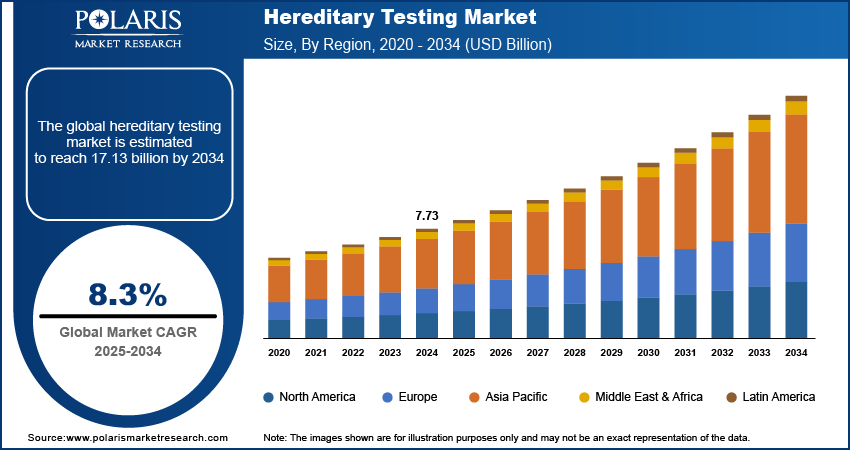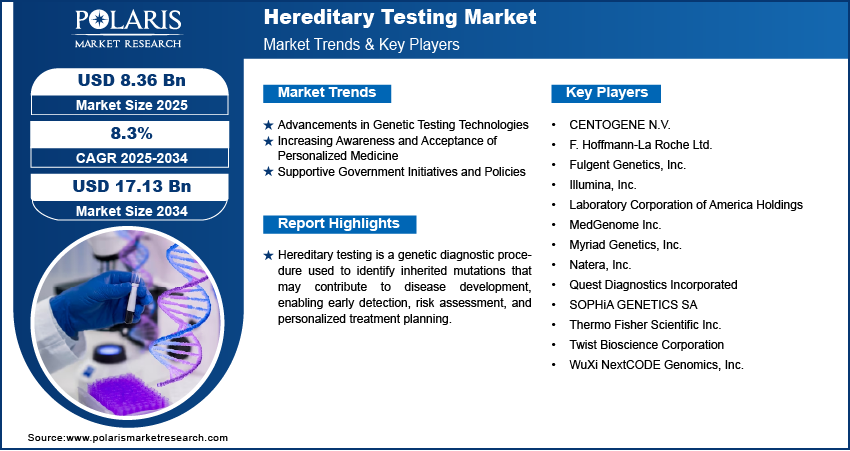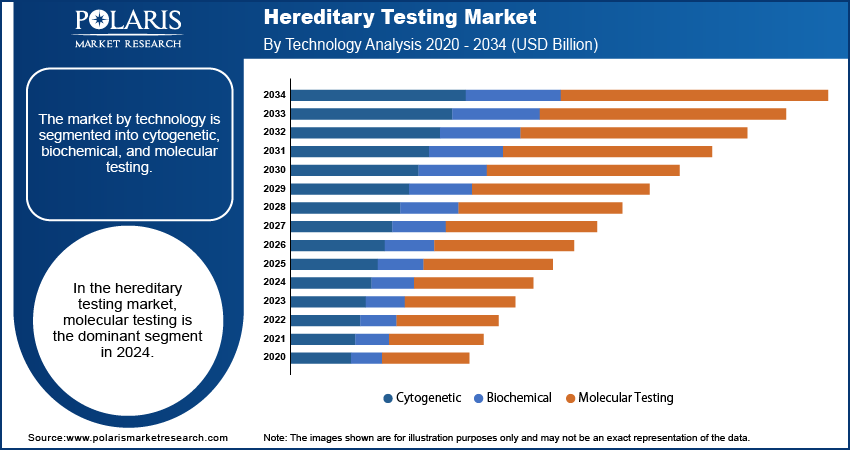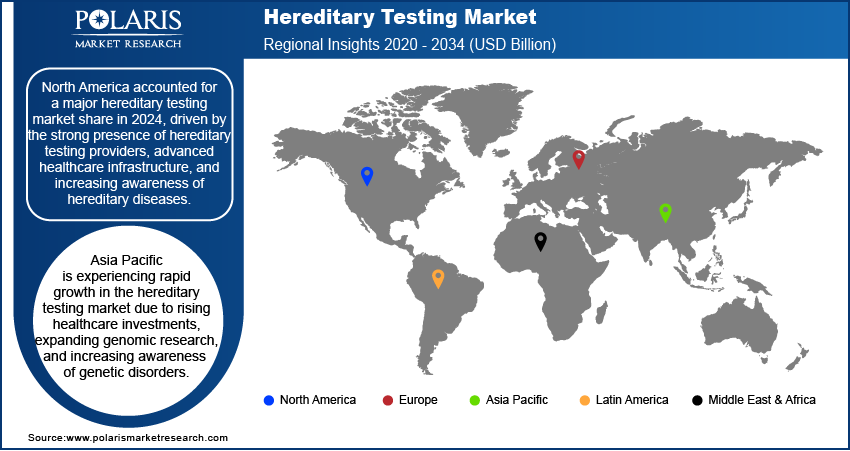
Hereditary Testing Market Share, Size, Trends, Industry Analysis Report, By Disease Type (Hereditary Cancer Testing and Hereditary Non-Cancer Testing); By Technology; By Region; Segment Forecast, 2024 - 2032
- Published Date:Jan-2024
- Pages: 118
- Format: PDF
- Report ID: PM1774
- Base Year: 2023
- Historical Data: 2019-2022
Report Outlook
The global hereditary testing market was valued at USD 7.25 billion in 2023 and is expected to grow at a CAGR of 6.80% during the forecast period.
The primary drivers driving market expansion include the increased frequency of hereditary disorders, increased public awareness of the negative consequences, advancements in genetic analysis, and the advent of uncommon diseases. Furthermore, most businesses are focused on women's healthcare inherited disorders and growing their presence in the ever-changing market area.

To Understand More About this Research: Request a Free Sample Report
Furthermore, another primary market trend is the increasing reproduction genetic health arena. Natera, for example, has shown steady growth in test numbers in women 's health genetic analysis for hereditary disorders. This indicates the population's increased acceptance of hereditary testing, exacerbating revenue market growth.
The outbreak of COVID-19 had a negative impact on the market. For example, after the WHO classified COVID-19 as a pandemic, governments worldwide implemented lockdowns to enforce social separation as a preventative precaution. This resulted in disruption, limitations, problems, and changes in every industry area. Likewise, the outbreak has had a detrimental impact on the market for hereditary genetic analysis.
This is due to genetic counselors' inability to visit individuals in person, doctors' failure to provide guidance, and the laboratory's inability to execute the tests. Furthermore, regulatory entities such as the Centers for Medicaid Services (CMS) do not yet recognize genetic counselors as healthcare practitioners. Therefore, they are not excluded from working during shutdowns.
In addition, clinics curtailed face-to-face diagnostic tests to aid in the prevention of the disease's spread. Nevertheless, genetic testing behemoths like GeneDx offered a service in which they supplied clinician-ordered genetic screening. Likewise, clinics, healthcare practitioners, and individuals now utilize telemedicine to undertake genetic counseling.
Furthermore, because prenatal testing is so important, it is the least impacted of all forms of genetic analysis. Many perinatal genetic counselors, for example, reported delivering face-to-face assistance during the outbreak. As a result, the outbreak had a massively negative influence on the genetic testing market.

For Specific Research Requirements, Request for a Customized Report
Industry Dynamics
Growth Drivers
A steady rise in demand for genetic testing has increased purchases of DNA screening kits. For example, in November 2019, the Virginia Department of General Services Division of Integrated Laboratory Facilities evaluated 7,867 babies for over 31 genetic and metabolic diseases. Increased use of newborn screening worldwide is also helping drive revenue market growth.
Changes in genetic testing protocols have resulted in the clinical use of multigene panel screening for hereditary diseases. The NCCN Clinical Practice Recommendations in Oncology for ovarian, breast, and colorectal malignancies include information on various cancer risk variables and treatment guidelines for individual and multiple genetic panels.
The hereditary genetic testing market is projected to gain from gradual changes in the distribution strategy. Technological suppliers are important in market expansion by boosting distribution services and increasing technical efficiency. Organizations utilize a cloud-based delivery approach to make bioinformatics technologies accessible to other institutions. As of March 2019, about 14 licensees started actively offering Non-invasive Prenatal Testing (NIPT) devices employing constellation software.
Report Segmentation
The market is primarily segmented based on disease type, technology, and region.
|
By Disease Type |
By Technology |
By Region |
|
|
|
To Understand More About this Research: Speak to Analyst
The Hereditary Non-cancer Testing Segment Held a Significant Revenue Share in the Market in 2022
The hereditary non-cancer testing segment dominates the market, with a significant revenue share in 2022 and a projected compound annual growth rate. Companies strategically focus on the lucrative breast cancer genetic testing segment, while the affordability of hereditary tests and the high risk of breast cancer in BRCA1 carriers drive market expansion. However, the market for hereditary testing in lung cancer and cervical cancer is relatively limited due to the low association with inherited genetic mutations and the predominant role of factors like HPV, respectively.
Prenatal testing, particularly cell-free DNA-based non-invasive prenatal testing (NIPT), is gaining popularity. Expanded coverage by insurance providers for NIPT in high-risk pregnancies and the inclusion of more conditions beyond trisomy screening drive market growth and adoption. Despite associated risks, the increasing usage of NIPT in prenatal care contributes to the overall market expansion.
The Molecular Testing Segment Dominated the Market in 2022
The molecular testing segment emerged as the dominant force in the market, capturing a substantial revenue share in 2022. Projections indicate that this segment will continue its impressive growth trajectory, outpacing other segments over the forecast period. The escalating adoption of molecular testing for genetic disease screening and diagnosis and the strategic endeavors undertaken by market players are expected to fuel the segment's expansion in the forthcoming years.
Cytogenetic technology plays a crucial role in genetic testing as it enables the examination of chromosomal abnormalities and structural changes within the genome. It stands as one of the promising technologies within the hereditary testing market. The growing adoption of cytogenetic tests for cancer detection and their cost-effectiveness when compared to alternative technologies are among the key factors propelling the growth of this segment during the projected period.

Europe Held the Largest Market Share in 2022
Europe is expected to contribute the highest revenue market share in 2022 and maintain its dominance throughout the projection timeframe. It can be ascribed to significant businesses offering genetic tests, the widespread use of modern therapies, and government guidelines to maintain the integrity of hereditary testing screening.
North America is anticipated to hold a significant market revenue percentage by the end of 2032. The region's expansion is attributed to numerous regulatory regimes, high incidence and consciousness of genetic illnesses' negative effects and financial impact, and commercial acceptance of hereditary tests.
According to the National Institutes of Health (NIH), greater than 30 Billion individuals in the U.S. suffer from around 7,000 genetic disorders. Increasing income levels are bound to help regional market development as the number of people getting hereditary genomic testing increases. Blueprint Genetics, a Finnish firm, teamed with ARCHIMEDlife, a rare illness diagnostics business, in September 2019 to deliver biochemical screening for rare conditions in North America. Both companies intended to broaden their genetic illness diagnostic services range through this collaboration to serve their clients better. Such activities will likely boost the genetic screening scenario for hereditary illnesses in North America, resulting in faster regional income creation.
Competitive Insight
Some of the major players operating in the global market include Twist Bioscience, MedGenome, COOPERSURGICAL, INC., Thermo Fisher Scientific, Inc., Laboratory Corporation of America Holdings, Illumina, Inc., CENTOGENE N.V., Agilent Technologies, Inc., F. Hoffmann-La Roche Ltd., SOPHiA GENETICS, Fulgent Genetics, Myriad Genetics, Inc., Natera, Inc., Invitae Corporation, and Quest Diagnostics Incorporated.

Recent Developments
- In February 2023, MedGenome introduced a new genetic test designed for diagnosing Facioscapulohumeral Muscular Dystrophy in India. This launch by MedGenome signifies the company's commitment to advancing genetic testing capabilities and addressing specific medical conditions in the Indian market.
- In June 2021, Illumina and Next Generation Genomic joined forces to introduce the VeriSeq™ NIPT Solution in Thailand. This collaboration aimed to bring advanced non-invasive prenatal testing to the Thai market, offering enhanced screening capabilities for expecting mothers.
Hereditary Testing Market Report Scope
|
Report Attributes |
Details |
|
Market size value in 2024 |
USD 7.7 billion |
|
Revenue forecast in 2032 |
USD 13.03 billion |
|
CAGR |
6.80% from 2024 – 2032 |
|
Base year |
2023 |
|
Historical data |
2019 – 2022 |
|
Forecast period |
2024 – 2032 |
|
Quantitative units |
Revenue in USD billion and CAGR from 2024 to 2032 |
|
Segments Covered |
By Disease Type, By Technology, By Region |
|
Regional scope |
North America, Europe, Asia Pacific, Latin America, Middle East & Africa |
|
Key Companies |
Twist Bioscience, MedGenome, COOPERSURGICAL, INC., Thermo Fisher Scientific, Inc., Laboratory Corporation of America Holdings, Illumina, Inc., CENTOGENE N.V., Agilent Technologies, Inc., F. Hoffmann-La Roche Ltd., SOPHiA GENETICS, Fulgent Genetics, Myriad Genetics, Inc., Natera, Inc., Invitae Corporation, and Quest Diagnostics Incorporated. |
FAQ's
The hereditary testing market report covering key segments are disease type, technology, and region
Hereditary Testing Market Size Worth $ 13.03 Billion By 2032
The global hereditary testing market is expected to grow at a CAGR of 6.2% during the forecast period
Europe is leading the global market
Key driving factors in hereditary testing market are Increase in the frequency of hereditary disorders, increased public awareness of the negative consequences, advancements in genetic analysis are the major drivers of this market
